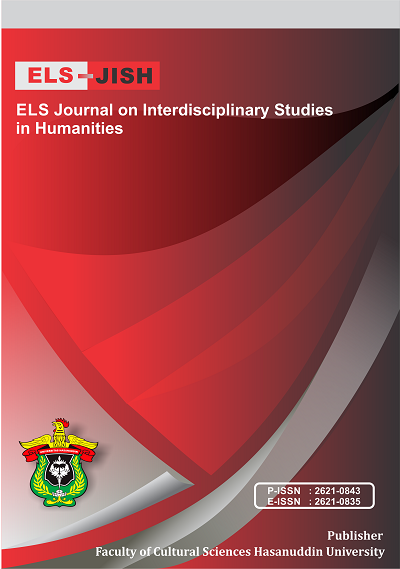Literature, Idea and the Feminist Consciousness in Charlotte Perkin Gilman’s “The Yellow Wall-Paper”
DOI:
https://doi.org/10.34050/elsjish.v5i2.20827Keywords:
literature, idea, Yellow Wall-Paper, Feminism, ConsciousnessAbstract
Literature reproduces social realities. These realities are furnished through ideas and form in the service of a society and every of its moments and events in history. Drawing from the foregoing proposition, this study explores the connection between literature, idea, and the feminist consciousness in Charlotte Perkin Gilman’s “The Yellow Wall-Paper” in order to demonstrate Gilman’s foregrounding of the challenge of a married woman. This study notes that Gilman’s portrayal re-echoes the challenges of contemporary women against the exertions of patriarchy, and the denial of the female voice and agency in marital space. Gilman underscores her theme through specific narrative strategies such as the creation of a cognitively active and questioning female character; who is prevented from exercising her artistic abilities and whose agency is stifled as a house wife without a name in contrast to her husband Dr. John. Another strategy is through the use of symbols such as the yellow wall paper to allegorize the female condition in marital sphere in the similitude of a prison and a caged existence. Importantly, while this paper locates the society as an important source of inspiration for the feminist idea manifest in “The Yellow Wall-Paper”, this paper submits that Gilman makes a demand for social change, and her short story constitutes a type of resistance to the narrative framing of women in domestic sphere by men, institution, authorities and orthodoxies as marginal and subalterns.
References
Abrams, M.H. (2005). A Glossary of Literary Terms. Eight Edition. Thomson & Wadsworth.
Aristotle.(1996). Poetics. Trans. Malcom Heath. Penguin Books.
Ashcroft, Bill, & Pal Ahluwalia. (1999) Routledge Critical Thinkers: Edward Said. 2 Edition. Routledge.
Baym, Nina. (1979) The Norton Anthology of American Literature. Fifth Edition, Vol. 2. Norton and Company Inc.
Bressler, Charles. (1994) Literary Theory: An Introduction to Theory and Practice. Prentice Inc.
Darwin, Charles. (1999, November 28) The Descent of Man, and Selection in Relation to Sex. The Project Gutenberg Ebook.
Eagleton, Terry. (2008) Literary Theory An Introduction An Anniversary Edition. Blackwell Publishing.
George, Ritzer & Jeffrey, Stepnisky. (214) Sociological Theory. Ninth Edition. McGraw-Hill Education Penn Plaza.
Gilman, Charlotte Perkin. (1971). The Waste of Private House Keeping. In The New Feminism in Twentieth-Century America. D.C. Heath and Company.
Gilman, Charlotte Perkin. (1979). The Yellow Wall-Paper. In Baym, Nina (Ed) The Norton Anthology of American Literature. Fifth Edition, Vol. 2. Norton and Company Inc.
Mackinnon, A. Catherine. (1989).Towards a Feminist Theory of the State. Harvard University Press.
Mohanty, P. Satya. (1979). Literary Theory and the Claim of History: Postmodernism, Objectivity, Multicultural Politics. Cornell University Press.
Petrie, Charles. (1960). The Victorians. Eyre& Spottiswoode.
Saadawi, El Nawal. (n.d).The Heroine in Arab Literature.” In African Literature an Anthology of Criticism. Eds. Olaniyan Tejumola and Quayson Ato. Blackwell Publishing, 2010: 520-525.
Said, Edward W. (1983). The world, the text, and the critic. Harvard University Press.
Sartre, Jean-Paul. What is Literature?. Bernard Frechtman (Trans.), David Caute (Intro.). Routledge, 1978.
Udumukwu, Onyemaechi. (2017). Literary Theory and Criticism an Introduction. Charles-Martins Higher Education and Consulting Company.
Uko, I., Iniobong. (2017,February, 23 ) The Feminine Ontology and the African Reality: Changing Dynamics in an Evolving Society. 52 inaugural lecture university of Uyo, Uyo. University of Uyo Press Ltd.
Wellek, Rene, & Warren, Austin. (1956). Literary Theory. A Harvest Book Harcourt Brace & World Inc.
Wollstonecraft, Mary. (1967). A Vindication of the Right of Women. Norton & Company Inc.
Benjamin, Walter.(1986). Understanding Brecht. Translated by Anna Bostock Introduction by Stanley Mitchell. Verso.
Downloads
Published
How to Cite
Issue
Section
License
Copyright (c) 2022 Okwudiri Anasiudu

This work is licensed under a Creative Commons Attribution-NonCommercial-ShareAlike 4.0 International License.






